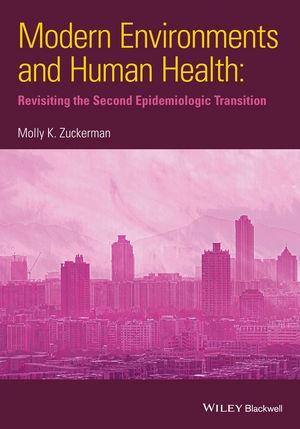Read more
Written in an engaging and jargon-free style by a team of international and interdisciplinary experts, Modern Environments and Human Health demonstrates by example how methods, theoretical approaches, and data from a wide range of disciplines can be used to resolve longstanding questions about the second epidemiological transition. The first book to address the subject from a multi-regional, comparative, and interdisciplinary perspective, Modern Environments and Human Health is a valuable resource for students and academics in biological anthropology, economics, history, public health, demography, and epidemiology.
List of contents
Contributors vii
Acknowledgments ix
1 Introduction: Interdisciplinary Approaches to the Second Epidemiologic Transition 1
Molly K. Zuckerman
Part 1 Causes of the Second Epidemiologic Transition
2 Infectious Disease in Philadelphia, 1690-1807: An Ecological Perspective 17
Gilda M. Anroman
3 Modeling the Second Epidemiologic Transition in London: Patterns of Mortality and Frailty during Industrialization 35
Sharon N. DeWitte
4 The Wider Background of the Second Transition in Europe: Information from Skeletal Material 55
Nikola Koepke
5 The Epidemiological Transition in Practice: Consumption, Phthisis, and TB in the 19th Century 81
Jeffrey K. Beemer
Part 2 Epidemic Infectious Disease and the Second Epidemiologic Transition
6 Agent-Based Modeling and the Second Epidemiologic Transition 105
Carolyn Orbann, Jessica Dimka, Erin Miller and Lisa Sattenspiel
7 Does Exposure to Influenza Very Early in Life Affect Mortality Risk during a Subsequent Outbreak? The 1890 and 1918 Pandemics in Canada 123
Stacey Hallman and Alain Gagnon
Part 3 Regional and Temporal Variation in the Second Epidemiologic Transition
8 The Second Epidemiologic Transition in Western Poland 139
Alicja Budnik
9 The Timing of the Second Epidemiologic Transition in Small US Towns and Cities: Evidence from Local Cemeteries 163
Lisa Sattenspiel and Rebecca S. Lander
10 Industrialization and the Changing Mortality Environment in an English Community during the Industrial Revolution 179
Peter M. Kitson
Part 4 Marginalized and Underrepresented Communities in the Second Epidemiologic Transition
11 Short Women and Their Stagnating Growth: A Study of Biological Welfare and Inequality of Women in Postcolonial India 201
Aravinda Meera Guntupalli
12 Tracking the Second Epidemiologic Transition Using Bioarchaeological Data on Infant Morbidity and Mortality 225
Megan A. Perry
13 The Biological Effects of Urbanization and In-Migration on 19th-Century-Born African Americans and Euro-Americans of Low Socioeconomic Status: An Anthropological and Historical Approach 243
Carlina de la Cova
Part 5 The Environment and the Second Epidemiologic Transition
14 Reassessing the Good and Bad of Modern Environments: Developing a More Comprehensive Approach to Health Trend Assessment 267
Lawrence M. Schell
15 Childhood Lead Exposure in the British Isles during the Industrial Revolution 279
Andrew Millard, Janet Montgomery, Mark Trickett, Julia Beaumont, Jane Evans, and Simon Chenery
16 The Hygiene Hypothesis and the Second Epidemiologic Transition 301
Molly K. Zuckerman and George J. Armelagos
17 Comparative Parasitological Perspectives on Epidemiologic Transitions: The Americas and Europe 321
Karl J. Reinhard and Elisa Pucu de Araújo
Part 6 Epilogue
18 The Second Epidemiologic Transition, Adaptation, and the Evolutionary Paradigm 339
George J. Armelagos
19 The Second Epidemiologic Transition from an Epidemiologist's Perspective 353
Nancy L. Fleischer and Robert E. McKeown
20 Methodological Perspectives on the Second Epidemiologic Transition: Current and Future Research 369
Richard H. Steckel
21 The Current State of Knowledge on the Industrial Epidemiologic Transition: Where Do We Go from Here? 377
Timothy B. Gage
Index 393
About the author
Molly K. Zuckerman is Assistant Professor in the Department of Anthropology and Middle Eastern Cultures at Mississippi State University. The author of numerous peer-reviewed publications, Dr. Zuckerman also teaches introductory courses in anthropology and biological anthropology, osteology, and human behavior and disease.
Summary
Written in an engaging and jargon-free style by a team of international and interdisciplinary experts, Modern Environments and Human Health demonstrates by example how methods, theoretical approaches, and data from a wide range of disciplines can be used to resolve longstanding questions about the second epidemiological transition.
Report
"The volume serves as a critical step towards cross-disciplinary communication and shows promise that future research on epidemiologic transitions will draw from an even wider array of cross-disciplinary perspectives (e.g., Klaus, 2014)." ( American Journal of Human Biology , 9 February 2015)

